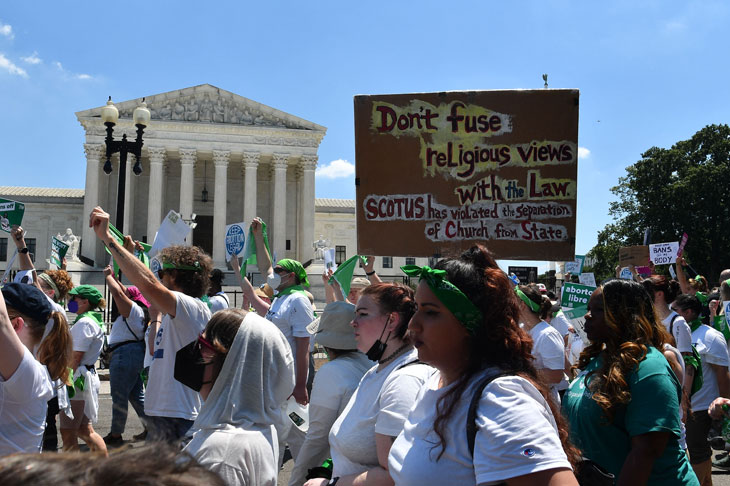This week I’d like to comment on a piece in the Australian last week by Henry Ergas because I think this is very important. Normally my views line up pretty well with Henry’s. But his piece last week was seriously misguided. In it, Ergas argued that conservatives ought to be lamenting the US Supreme Court’s overturning of Roe v. Wade and they ought to be doing so because stare decisis – basically the doctrine that courts stand by past decisions save in extreme instances – is a more important value than the fact the Roe case was wrongly decided. Ergas argued that only in instances of ‘manifest error’ ought a top court overturn past precedents. He drew an analogy (to me wrong-headed) with the Brown v. Board of Education case. Basically, Ergas would have been happy for the top court in the US to stand by Roe. He even claimed this was the ‘conservative’ position.
I won’t sugar-coat my response. Every main point Ergas makes is wrong. First off, in his long detailing of the history of stare decisis Ergas omits to mention that this doctrine evolved in England, which has a Diceyan unwritten constitution and it did so in the context of common law (or judge-made) law-making. And always lurking in the background of the common law are potential statutes coming in to overrule the judges – meaning the elected legislature can any time it wishes step in and overrule the judge-made laws (i.e. common law). So stare decisis makes a lot of sense in that context. But now translate that doctrine to a system with a written constitution with unelected judges specifically interpreting its provisions. What the judges say here cannot be second-guessed or overridden by any elected branch because the judges are speaking in the name of ‘the Constitution’. So the question arises whether the interpreter’s greater loyalty or fealty is, or ought to be a) to this over-arching constitution and its honest and proper interpretation or b) to what some of his past colleagues claimed it said? If you side with b) here it is nothing like siding with stare decisis as regards the common law (when the elected legislature can step in) or even as regards the interpretation of statutes (when, again, the elected legislature can step in to correct the judges). If you think about it for even a moment you’ll see that Ergas’s position is profoundly undemocratic. Worse, what the US Supreme Court did in over-turning Roe was simply to return the issue of abortion to the elected legislatures of the states, the way the issue has been resolved in virtually every democratic country on earth save the US and Canada (where the judges have become wannabe philosopher kings who make nearly all the main social policy calls). What’s wrong with that consequence Henry? I ask that seriously.
Worse again, the Roe case was a manifest error. It relied on the most implausible reasoning going. Near on nine out of ten US law professors surveyed at the time, the vast preponderance unsurprisingly being lefties, described Roe at the time as wrong. Worse again (and again), the Ergas outlook is a recipe for judicial activism on steroids and usually by left-leaning judges. That’s because there’s a sort of asymmetry at work. Those who care little for past precedent or stare decisis (and as an empirical matter they tend to be ‘progressive’ judges) will play fast and loose with precedents they don’t like. But Ergas wants – no, he thinks duty demands that – conservative judges not go around undoing their colleagues’ past made-up precedents because, well, ‘it’s not the done thing, old boy’ or some such rationale that’s hard to pin down. And let’s be clear. This Dobbs override decision was the first chance for an interpretively conservative or originalist majority on the US Supreme Court to act – because it’s so hard with today’s lawyerly caste being as progressively woke as it is (I generalise) to appoint interpretive conservatives. So it’s not as though a bunch of conservative judges have been waiting around for decades to do this and just now, out of the blue, opted to pull the switch.
Hence, Henry is triply wrong. You can’t take a sensible rule designed for the common law (or for law made by unelected judges) and apply it in some puritanical way to the interpretation of a written constitution that affects every single citizen. Being happy to be governed by a constitution is not equivalent to being happy to be governed by unelected judges who in some past case just made up an outcome that matched their political preferences or druthers. I go further. It is attitudes like Ergas’s that have seen the Coalition make hopeless appointments to our top court ever since John Howard was voted out. (I generalise, you understand, but that is the gist of the matter.)
Remember the woeful Love case where our High Court (in my view) holus-bolus out of thin air simply made up some entitlement for non-citizen people with a plausible claim to being Aborigines that prevented them being deported. Everyone else with different genes could be. But not them. And this was based on such deep-seated principles of constitutional law as ‘otherness’ and a stream of woke, identity politics claims that would make a person lacking a strong stomach want to barf (but on nothing, you know, in the actual Constitution itself).
How long is too long, Henry, before our High Court can no longer overturn Love on your view of what proper conservative judging entails? Is it okay to do so in the first five years but not thereafter? Maybe a decade? And how do you come up with your magical number?
I ask because as it happens our High Court has a case before it right now (Montgomery) where it is being asked to overturn Love. They absolutely should do so. There may be only one constitutional case in the entire anglosphere that was less persuasively reasoned and decided than Roe and that is Love. Ergas’s view has transplanted a sensible doctrine in one context (judge-made law) into another one (interpreting the country’s governing document) where all of us citizens become hostage to the views of a handful of unelected judges however self-serving or implausible their take on the case is.
No, let me be blunt. Ergas’s view is thoroughly undemocratic at core. It is also defeatist. ‘They can be activist and insouciant about past precedents but not us, old boy.’
That’s the gist of it.
Oh, and as for Brown v Board of Education, which is something of a shibboleth case in the US, its practical effects were very limited. What really undercut segregation in the US were democratically enacted laws, mainly the Voting Rights Act and the Civil Rights Act. That and President LBJ’s willingness to send in the troops. The analogy to Roe is wholly unpersuasive. For democrats like me (small ‘d’ let me make clear) who prefer social policy-making to be done via the elected legislature there is absolutely nothing to regret when a top court admits that its predecessors had engaged in an act of ‘raw judicial power’ (which is how a dissenter in Roe itself described the majority’s decision) and that they were going to fix that. Half a century was a long time to wait. But better late than never Henry.
Got something to add? Join the discussion and comment below.
Get 10 issues for just $10
Subscribe to The Spectator Australia today for the next 10 magazine issues, plus full online access, for just $10.
You might disagree with half of it, but you’ll enjoy reading all of it. Try your first month for free, then just $2 a week for the remainder of your first year.














Comments
Don't miss out
Join the conversation with other Spectator Australia readers. Subscribe to leave a comment.
SUBSCRIBEAlready a subscriber? Log in